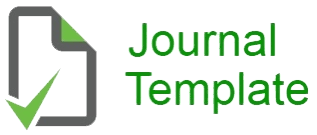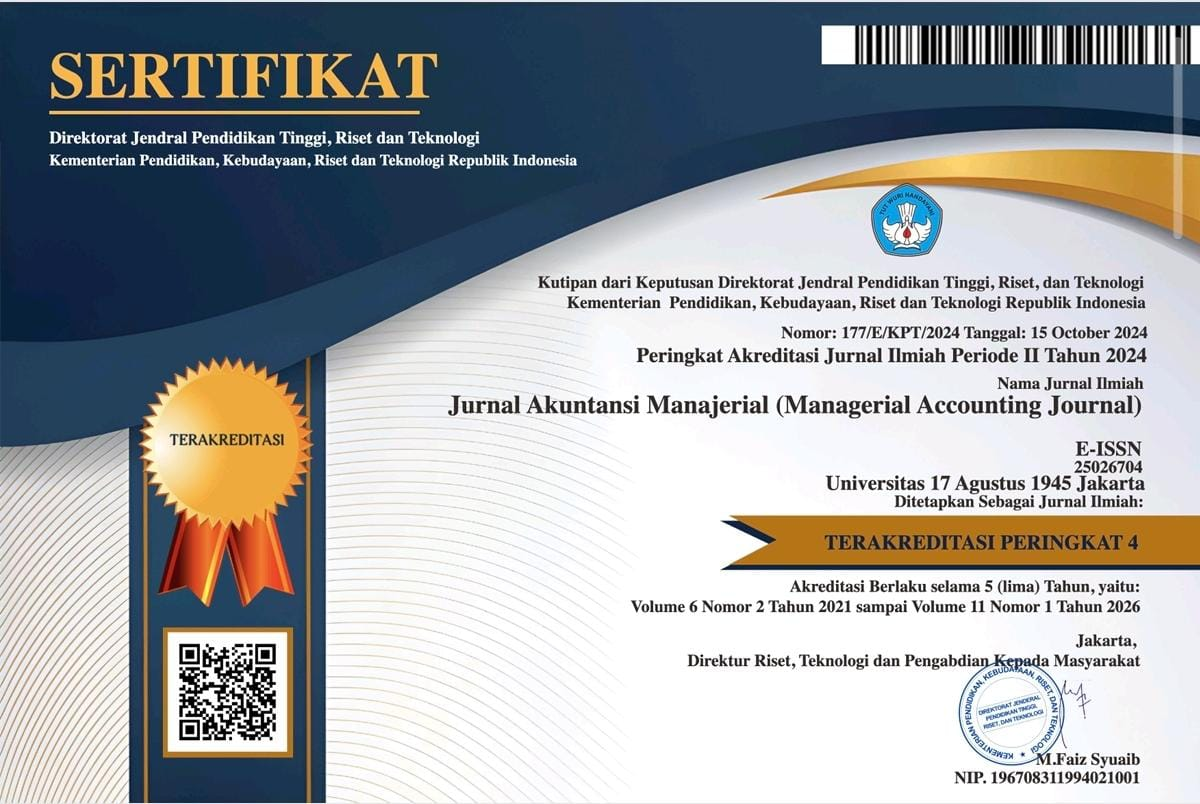Pengaruh Literasi Akuntansi dan Pemahaman Etika Profesi Akuntansi Terhadap Komitmen Tidak Korupsi dengan Pendidikan Keluarga Sebagai Pemoderasi
Abstract
Keywords
Full Text:
PDF (Bahasa Indonesia)References
Ajzen. (1991). The Theory Planned Behavior. Organizational Behavior and Human Decision Processes.
Akhyadi, A. S., & Mulyono, D. (2019). Program Parenting Dalam Meningkatkan Kualitas Pendidikan Keluarga. Abdimas Siliwangi, 1(1), 1. https://doi.org/10.22460/as.v1i1p1-8.34
Anggraini, D., & MY, A. S. (2022). Etika Profesi Akuntan Ditinjau Dari Persepsi Akuntan Dan Mahasiswa Akuntansi. Management and Accounting Expose, 5(1), 59–69. https://doi.org/10.36441/mae.v5i1.592
Anisa, Anifa, F., Fadhila, N., Prawira, I. F. A., & Nasim, A. (2021). Analisis Etika Profesi Akuntan dalam Standar Internasional. Jurnal Akuntansi, 16(1), 74–84.
Apostolou, B., Dorminey, J. W., Hassell, J. M., & Hickey, A. (2019). Accounting education literature review (2018). Journal of Accounting Education, 47, 1–27. https://doi.org/10.1016/j.jaccedu.2019.02.001
Bayu, D. (2023). ICW: Penindakan Kasus Korupsi Meningkat pada tahun 2022. DataIndonesia.Id.
Dhar, B. K., Sarkar, S. M., & Ayittey, F. K. (2022). Impact of social responsibility disclosure between implementation of green accounting and sustainable development: A study on heavily polluting companies in Bangladesh. Corporate Social Responsibility and Environmental Management, 29(1), 71–78. https://doi.org/10.1002/csr.2174
Fajriyah, I., & Agung, L. (2021). Pengaruh Uang Saku dan Pendidikan Keuangan Keluarga terhadap Pengelolaan Keuangan Pribadi melalui Literasi Keuangan sebagai intervening. INOVASI, Jurnal Ekonomi Keuangan Dan Manajemen, 17(1), 61–72.
Hatta, A. J., & Budiyati, O. (2021). Tingkat Pendidikan, Literasi Akuntansi, Dan Persepsi Pemilik Umkm Tentang Akuntansi Sebagai Determinan Penggunaan Informasi Akuntansi. Akuntansi Dewantara, 5(2), 112–121. https://doi.org/10.26460/ad.v5i2.11044
Hidayati, S. (2021). Optimalisasi Fungsi Keluarga Sebagai Strategi Pemberantasan Korupsi. KELUARGA: Jurnal Ilmiah Pendidikan …, 7(1), 59–70.
Ikatan Akuntan Indonesia. (2020). Kode Etik Akuntan Indonesia. In Institut Akuntan Manajemen Indonesia.
Indrajaya, A. N., Susanti, Y. F., Widjaja, R. E., & Setianto, C. (2021). Menumbuhkan Integritas melalui Karakter Anti Korupsi. Journal of Sustainable Community Development, 3, 11–20.
Jeppesen, K. K. (2019). The role of auditing in the fight against corruption. British Accounting Review, 51(5). https://doi.org/10.1016/j.bar.2018.06.001
Julito, K. A., Hambali, A. J. H., & Hapsoro, D. (2021). The Role of Self Efficacy in Improving Financial Literacy In Msme Sustainability, Yogyakarta Special Region. 20(12), 46–55. https://doi.org/10.9790/0853-2012044655
Kharismawati, F. A. (2013). Pengaruh Penerapan Etika Profesi Terhadap Profesionalisme Akuntan Publik Dengan Kecerdasan Intelektual, Kecerdasan Emosional, Dan Kecerdasan Spiritual Sebagai Variabel Moderasi. Journal of Chemical Information and Modeling, 53(9), 1689–1699.
Khasiani, K., Koshima, Y., Mfombouot, A., & Singh, A. (2020). Budget Execution Controls to Mitigate Corruption Risk in Pandemic Spending. Fiscal Affairs - International Monetary Fund, 1–9.
Latan, H., Chiappetta Jabbour, C. J., & Lopes de Sousa Jabbour, A. B. (2019). Ethical Awareness, Ethical Judgment and Whistleblowing: A Moderated Mediation Analysis. Journal of Business Ethics, 155(1), 289–304. https://doi.org/10.1007/s10551-017-3534-2
Mamluah, A., & Jalil, A. (2022). Pendidikan Antikorupsi Dalam Keluarga: Upaya Membangun Keluarga Sakinah. CENDEKIA: Jurnal Studi Keislaman, 8(2), 140–160. https://doi.org/10.37348/cendekia.v8i2.183
Muhamad, N., & A. Gani, N. (2020). A decade of corruption studies in Malaysia. Journal of Financial Crime, 27(2), 423–436. https://doi.org/10.1108/JFC-07-2019-0099
Nurbaeti, I., Mulyati, S., & Sugiharto, B. (2019). The Effect of Financial Literacy and Accounting Literacy To Entrepreneurial Intention Using Theory of Planned Behavior Model in Stie Sutaatmadja Accounting Students. JASS (Journal of Accounting for Sustainable Society), 1(2012), 1. https://doi.org/10.35310/jass.v1i01.65
Okafor, O. N., Adebisi, F. A., Opara, M., & Okafor, C. B. (2020). Deployment of whistleblowing as an accountability mechanism to curb corruption and fraud in a developing democracy. Accounting, Auditing and Accountability Journal, 33(6), 1335–1366. https://doi.org/10.1108/AAAJ-12-2018-3780
Pahlevi, R. W., & Nashrullah, L. (2021). Pendidikan Keuangan Keluarga, Kesadaran Keuangan dan Tingkat Personal Finance. AFRE (Accounting and Financial Review), 3(2), 172–179. https://doi.org/10.26905/afr.v3i2.5840
Pustha, F. W. T. B., & Fauzan, A. (2021). Faktor Yang Mempengaruhi Pencegahan Dan Upaya Pemberantasan Korupsi. Jurnal Manajemen Pendidikan Dan Ilmu Sosial, 2(2), 580–585. https://doi.org/10.38035/jmpis.v2i2.599
Putra, R. R., & Dayanti, E. (2022). Pengaruh Kemampuan Akuntansi dan Budaya Organisasi terhadap Kinerja Perusahaan dengan SIA sebagai Variabel Moderasi. Owner, 6(3), 1507–1516. https://doi.org/10.33395/owner.v6i3.993
Rifai, M. H., & Mardijuwono, A. W. (2020). Relationship between auditor integrity and organizational commitment to fraud prevention. Asian Journal of Accounting Research, 5(2), 315–325. https://doi.org/10.1108/AJAR-02-2020-0011
Rinenggo, A., Kusumawati, I., Stiyawan, Z., & Sutiyono, S. (2022). Anti-Corruption Education in the Family, Community, School, and State. Academy of Education Journal, 13(1), 84–102. https://doi.org/10.47200/aoej.v13i1.975
Risti, C. A. M., & Putra, R. J. (2022). Pengaruh Literasi Keuangan Dan Pemanfaatan Financial Technology Terhadap Kepatuhan Pajak Pebisnis Online Yang Dimoderasi Digitalisasi Perpajakan. Owner, 6(3), 1574–1583. https://doi.org/10.33395/owner.v6i3.951
Rosa, I., & Listiadi, A. (2020). Pengaruh Literasi Keuangan, Pendidikan Keuangan di Keluarga, Teman Sebaya, dan Kontrol Diri Terhadap Manajeman Keuangan Pribadi. Jurnal Manajemen, 12(2), 244–252.
Roslan, N., Pauzi, N. F. M., Ahmad, K., Shamsudin, A., Karim, M. S., & Ibrahim, S. N. S. (2018). Preliminary Investigation: Accounting Literacy among Small Business Owners. International Journal of Academic Research in Business and Social Sciences, 8(10), 32–47. https://doi.org/10.6007/ijarbss/v8-i10/4709
Rustiarini, N. W., T, S., Nurkholis, N., & Andayani, W. (2019). Why people commit public procurement fraud? The fraud diamond view. Journal of Public Procurement, 19(4), 345–362. https://doi.org/10.1108/JOPP-02-2019-0012
Saepullah, A., Maulana, A., & Hawary, A. (2022). Manajemen Pendidikan Keluarga dalam Penanaman Karakter Jujur untuk Anak Usia Sekolah Dasar Family Education Management in Cultivating Honest Character for Elementary School Age Children. Diversity: Jurnal Ilmiah Pascasarjana, 2(2), 94–107. https://doi.org/10.32832/djip-uika.v2i2.7535
Sriwijayanti, A. R., Prastino, M. D., Anjelli, S., & Dony, A. (2022). Konsep dan Komitmen Pemberantasan Korupsi A . Konsep dilakukan dengan tujuan mempermudah dalam pencapaian suatu tujuan . Untuk. Jurnal Pendidikan Pancasila Dan Kewarganegaraan, 2(2), 227–242.
Syuliswati, A. (2020). Pendidikan Pengelolaan Keuangan Keluarga, Gaya Hidup, Pembelajaran Serta Pengaruhnya Terhadap Literasi Keuangan. Akutansi Bisnis & Manajemen ( ABM ), 27(1), 53. https://doi.org/10.35606/jabm.v27i1.553
Taib, A., Awang, Y., Shuhidan, S. M., Rashid, N., & Hasan, M. S. (2022). Digitalization in Accounting: Technology Knowledge and Readiness of Future Accountants. Universal Journal of Accounting and Finance, 10(1), 348–357. https://doi.org/10.13189/ujaf.2022.100135
Tambun, S., Heryanto, Mulyadi, Sitorus, R. R., & Putra, R. R. (2022). Peltihan Aplikasi Olah Data SmartPLS untuk Meningkatkan Skill Penelitian bagi Dosen Sekolah Tinggi Theologia Batam. Jurnal Pengabdian UNDIKMA, 3(2), 233–240. https://doi.org/https://doi.org/10.33394/jpu.v3i2.5519
Tambun, S., Rotua Sitorus, R., & Nurwanti, F. (2022). The Effect of Financial Literacy and Financial Education on Women’s Healthy Financial Behavior through Investment Motivation. Jurnal Keuangan Dan Perbankan, 26(2), 2443–2687. https://doi.org/10.26905/jkdp.v26i2.7387
Tambunan, B. H., & Silitonga, A. G. A. (2020). Pengaruh Pengetahuan Etika Profesi Akuntan Terhadap Persepsi Mahasiswa Akuntansi Mengenai Creative Accounting. Jurnal Riset Akuntansi Dan Bisnis, 20(2), 247–255.
Tedjasukmana, B., & Nagel, P. J. F. (2018). Peranan Literasi Akuntansi Bagi Pendidikan Kewirausahaan Dalam Memajukan Pembangunan Ekonomi Nasional. IPTEK Journal of Proceedings Series, 0(5), 259. https://doi.org/10.12962/j23546026.y2018i5.4444
Utami, L., Handajani, L., & Hermanto, H. (2019). Efektivitas Komite Audit dan Audit Internal terhadap Kasus Kecurangan dengan Whistleblowing System sebagai Variabel Pemoderasi. E-Jurnal Akuntansi, 26, 1570. https://doi.org/10.24843/eja.2019.v26.i02.p27
Visiana, K. (2022). Pengaruh pemahaman technology acceptance model dan pemahaman etika profesi akuntan terhadap komitmen menjadi akuntan profesional dengan penguasaan teknologi informasi sebagai variabel moderating. Jurnal Akuntansi Manajerial, 7(2), 85–97.
Wijayanti, A., Ramlah, R., & Saputri, I. A. (2022). Pengaruh Indepedensi dan Profesionalisme Terhadap Kualitas Audit Yang Dimoderasi Oleh Etika Profesi. Jesya, 5(2), 2354–2367. https://doi.org/10.36778/jesya.v5i2.826
Yulianti, M., Asniati, A., & Juita, V. (2021). Pengaruh Keahlian Akuntansi, Literasi Digital dan Literasi Manusia Terhadap Kesiapan Kerja Calon Akuntan di Era Disrupsi Teknologi Digital. Ekonomis: Journal of Economics and Business, 5(2), 449. https://doi.org/10.33087/ekonomis.v5i2.389
Yuwono, D. I. (2018). Memahami Berbagai Etika Profesi dan Pekerjaan. Yogyakarta: Medpress Digital.
DOI: https://doi.org/10.52447/jam.v8i1.6928
Refbacks
- There are currently no refbacks.
View My Stats






